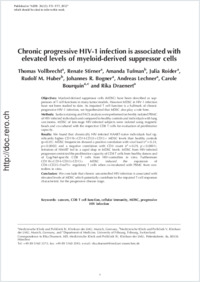Chronic progressive HIV 1 infection is associated with elevated levels of myeloid derived suppressor cells
- Vollbrecht, Thomas Medizinische Klinik und Poliklinik IV, Klinikum der LMU, Munich, Germany
- Stirner, Renate Medizinische Klinik und Poliklinik IV, Klinikum der LMU, Munich, Germany
- Tufman, Amanda Medizinische Klinik und Poliklinik V, Klinikum der LMU, Munich, Germany
- Roider, Julia Medizinische Klinik und Poliklinik IV, Klinikum der LMU, Munich, Germany
- Huber, Rudolf M. Medizinische Klinik und Poliklinik V, Klinikum der LMU, Munich, Germany
- Bogner, Johannes R. Medizinische Klinik und Poliklinik IV, Klinikum der LMU, Munich, Germany
- Lechner, Andreas Medizinische Klinik und Poliklinik IV, Klinikum der LMU, Munich, Germany
- Bourquin, Carole Medizinische Klinik und Poliklinik IV, Klinikum der LMU, Munich, Germany - Department of Medicine, University of Fribourg, Fribourg, Switzerland.
- Draenert, Rika Medizinische Klinik und Poliklinik IV, Klinikum der LMU, Munich, Germany
-
31.07.2012
Published in:
- AIDS. - 2012, vol. 26, no. 12, p. F31–F37
cancers
CD8 T-cell function
cellular immunity
myeloid-derived suppressor cell
progressive HIV infection
English
Objectives: Myeloid-derived suppressor cells (MDSCs) have been described as suppressors of T-cell functions in many tumor models. However, MDSC in HIV-1 infection have not been studied to date. As impaired T-cell function is a hallmark of chronic progressive HIV-1 infection, we hypothesized that MDSC also play a role here.Methods: Surface staining and flow cytometry analysis were performed on freshly isolated peripheral blood mononuclear cells (PBMC) of HIV-infected individuals and compared to healthy controls and individuals with lung carcinoma. MDSC of late-stage HIV-infected individuals were isolated using magnetic beads and cocultured with the respective CD8 T cells for evaluation of proliferative capacity.Results: We found that chronically HIV-infected HAART-naive individuals had significantly higher CD11b⁺CD14⁻CD33⁺CD15⁺ MDSC levels than healthy controls (P = 0.01). MDSC frequencies showed a positive correlation with viral load (r² = 0.24, P = 0.0002) and a negative correlation with CD4 cell count (r² = 0.29, P < 0.0001). Initiation of HAART led to a rapid drop in MDSC levels. MDSC from HIV-infected progressors restricted the proliferative capacity of CD8 T cells from healthy donors and of Gag/Nef-specific CD8 T cells from HIV-controllers in vitro. Furthermore, CD11b⁺CD14⁻CD33⁺CD15⁺ MDSC induced the expansion of CD4⁺CD25⁺FoxP3⁺ regulatory T cells when coincubated with PBMC from controllers in vitro.Conclusion: We conclude that chronic uncontrolled HIV-infection is associated with elevated levels of MDSC, which potentially contribute to the impaired T-cell responses characteristic for the progressive disease stage.
- Faculty
- Faculté des sciences et de médecine
- Department
- Département de Médecine
- Language
-
- English
- Classification
- Biological sciences
- License
- License undefined
- Identifiers
-
- RERO DOC 30503
- DOI 10.1097/QAD.0b013e328354b43f
- Persistent URL
- https://folia.unifr.ch/unifr/documents/302815
Statistics
Document views: 60
File downloads:
- bou_cph.pdf: 180
